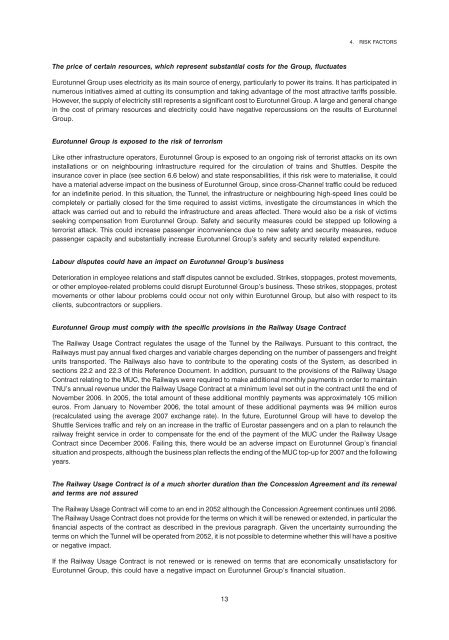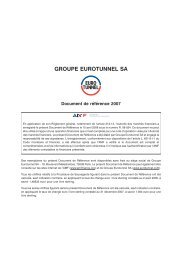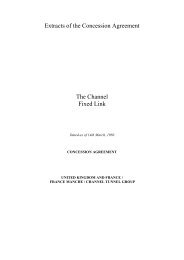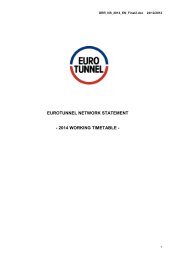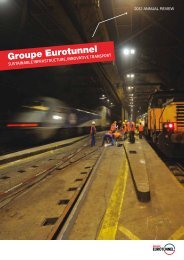2007 Reference Document for Groupe Eurotunnel SA PDF file size
2007 Reference Document for Groupe Eurotunnel SA PDF file size
2007 Reference Document for Groupe Eurotunnel SA PDF file size
Create successful ePaper yourself
Turn your PDF publications into a flip-book with our unique Google optimized e-Paper software.
4. RISK FACTORSThe price of certain resources, which represent substantial costs <strong>for</strong> the Group, fluctuates<strong>Eurotunnel</strong> Group uses electricity as its main source of energy, particularly to power its trains. It has participated innumerous initiatives aimed at cutting its consumption and taking advantage of the most attractive tariffs possible.However, the supply of electricity still represents a significant cost to <strong>Eurotunnel</strong> Group. A large and general changein the cost of primary resources and electricity could have negative repercussions on the results of <strong>Eurotunnel</strong>Group.<strong>Eurotunnel</strong> Group is exposed to the risk of terrorismLike other infrastructure operators, <strong>Eurotunnel</strong> Group is exposed to an ongoing risk of terrorist attacks on its owninstallations or on neighbouring infrastructure required <strong>for</strong> the circulation of trains and Shuttles. Despite theinsurance cover in place (see section 6.6 below) and state responsabilities, if this risk were to materialise, it couldhave a material adverse impact on the business of <strong>Eurotunnel</strong> Group, since cross-Channel traffic could be reduced<strong>for</strong> an indefinite period. In this situation, the Tunnel, the infrastructure or neighbouring high-speed lines could becompletely or partially closed <strong>for</strong> the time required to assist victims, investigate the circumstances in which theattack was carried out and to rebuild the infrastructure and areas affected. There would also be a risk of victimsseeking compensation from <strong>Eurotunnel</strong> Group. Safety and security measures could be stepped up following aterrorist attack. This could increase passenger inconvenience due to new safety and security measures, reducepassenger capacity and substantially increase <strong>Eurotunnel</strong> Group’s safety and security related expenditure.Labour disputes could have an impact on <strong>Eurotunnel</strong> Group’s businessDeterioration in employee relations and staff disputes cannot be excluded. Strikes, stoppages, protest movements,or other employee-related problems could disrupt <strong>Eurotunnel</strong> Group’s business. These strikes, stoppages, protestmovements or other labour problems could occur not only within <strong>Eurotunnel</strong> Group, but also with respect to itsclients, subcontractors or suppliers.<strong>Eurotunnel</strong> Group must comply with the specific provisions in the Railway Usage ContractThe Railway Usage Contract regulates the usage of the Tunnel by the Railways. Pursuant to this contract, theRailways must pay annual fixed charges and variable charges depending on the number of passengers and freightunits transported. The Railways also have to contribute to the operating costs of the System, as described insections 22.2 and 22.3 of this <strong>Reference</strong> <strong>Document</strong>. In addition, pursuant to the provisions of the Railway UsageContract relating to the MUC, the Railways were required to make additional monthly payments in order to maintainTNU’s annual revenue under the Railway Usage Contract at a minimum level set out in the contract until the end ofNovember 2006. In 2005, the total amount of these additional monthly payments was approximately 105 millioneuros. From January to November 2006, the total amount of these additional payments was 94 million euros(recalculated using the average <strong>2007</strong> exchange rate). In the future, <strong>Eurotunnel</strong> Group will have to develop theShuttle Services traffic and rely on an increase in the traffic of Eurostar passengers and on a plan to relaunch therailway freight service in order to compensate <strong>for</strong> the end of the payment of the MUC under the Railway UsageContract since December 2006. Failing this, there would be an adverse impact on <strong>Eurotunnel</strong> Group’s financialsituation and prospects, although the business plan reflects the ending of the MUC top-up <strong>for</strong> <strong>2007</strong> and the followingyears.The Railway Usage Contract is of a much shorter duration than the Concession Agreement and its renewaland terms are not assuredThe Railway Usage Contract will come to an end in 2052 although the Concession Agreement continues until 2086.The Railway Usage Contract does not provide <strong>for</strong> the terms on which it will be renewed or extended, in particular thefinancial aspects of the contract as described in the previous paragraph. Given the uncertainty surrounding theterms on which the Tunnel will be operated from 2052, it is not possible to determine whether this will have a positiveor negative impact.If the Railway Usage Contract is not renewed or is renewed on terms that are economically unsatisfactory <strong>for</strong><strong>Eurotunnel</strong> Group, this could have a negative impact on <strong>Eurotunnel</strong> Group’s financial situation.13


